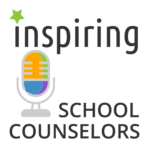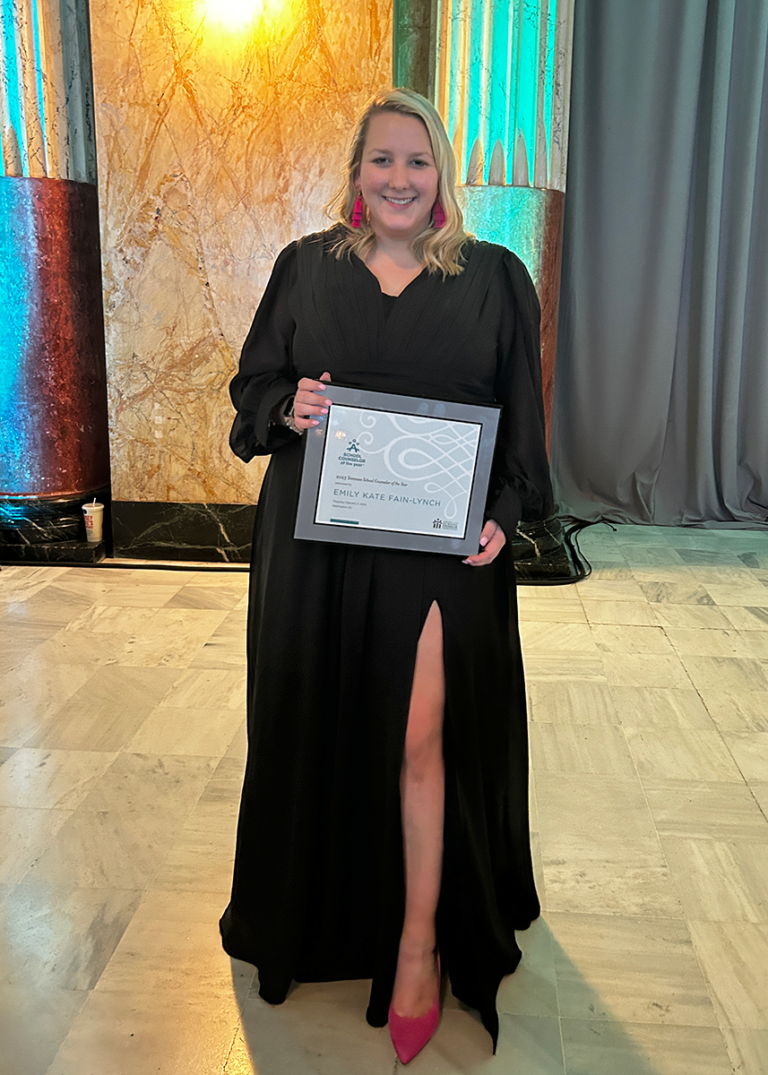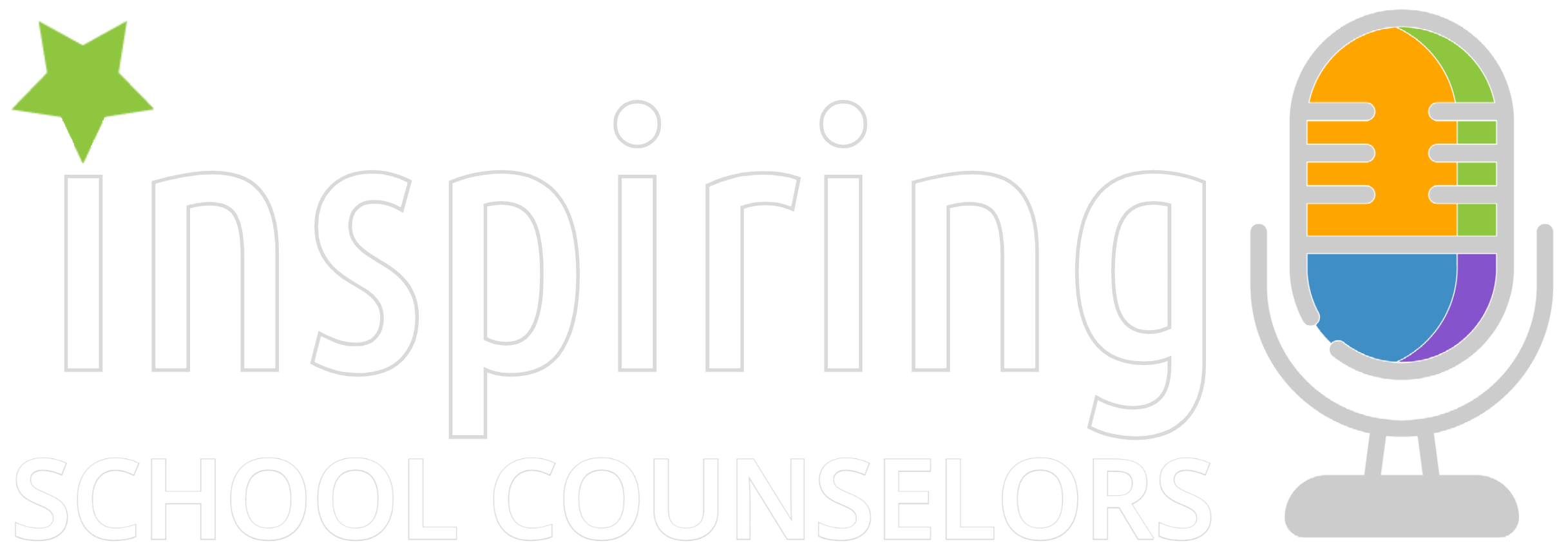If you need some school counseling time saving tips, scheduling suggestions, and escapism resources to relax after a long day at school, you’ll want to listen in to this engaging podcast with Tennessee School Counselor of the Year Emily Fain Lynch.

About Emily Fain Lynch
Emily Fain Lynch is an Elementary School Counselor and Student Supports Department Chair at Green Magnet STEAM Academy in Knoxville, TN. She is also Tennessee School Counselor of the Year and an active mother of two little ones. As part of her comprehensive school counseling program, Emily enjoys incorporating STEAM programming in her classroom lessons as well through co-teaching with various staff members.
Find Emily on Social Media

We Want to Hear from You!

What’s your best advice for other school counselors? Who has influenced you? What books do you recommend? We want to know! Please take a few minutes to complete the Inspiring School Counselors form.
Subscribe
Inspiring School Counselors is available on these podcast apps and others. If you can’t find the podcast on your favorite app, let us know and we’ll make sure we get there. If you prefer to listen in your browser, visit https://inspiresuccess.org/podcast every week for a new episode. For new episode notifications and more, follow Inspire Success on Facebook, Instagram, or Twitter.
Transcript
A rough transcript follows.
Matt Fleck:
Hi everyone and welcome back to the Inspiring School Counselor’s podcast. I’m Matt Fleck with Inspire Success. Though we all know you can’t do it all, some school counselors still give it a good solid try. Such is the case with Emily Fain Lynch elementary school counselor at of Magnet Steam Academy in Knoxville, Tennessee focused on science, technology, engineering, arts and mathematics. Emily took a few minutes out of her busy schedule as a counselor and mom to talk with our own Aimee Portteus about why she is Tennessee’s school counselor of the year.
Emily Fain Lynch:
We are a Tennessee STEM designated school and a big piece of what I do is I integrate through in our STEAM programming. So I do a lot of steam stuff, which is really, really fun and exciting.
Aimee Portteus:
Oh, I’m gonna need to hear a little bit more about that. So how does school counseling and STEAM go together?
Emily:
We have something called an engineering design lab at our school. And so the way the engineering design lab works is every class comes to the engineering design lab once a nine weeks and they spend the entire day in there. So they go to their special areas of music and art and they go to lunch and recess, but they’re reading math, all that stuff. They don’t do that that day. They’re in the engineering design lab and their teacher comes with them. I really got plugged in because I was really good friends with a second grade teacher and she moved from the second grade teacher position to the engineering design lab and I said, Hey, why don’t we collaborate and teach a lesson about teamwork? Because in the engineering design lab they work together. Like that’s a big piece of what they do and teamwork is huge in our standards in getting along with others.
And so I said, why don’t we co-teach a lesson and talk about teamwork with the kids and then actually let them practice that teamwork together in the design lab with a build. And it went so beautifully that now we have named our co-teaching camp engineering feelings. So when they come to us and we’re together, we call it Camp Engineering feelings. So two years later we now see every class once a semester together. Um, and then we also host many challenges and shorter challenges. So we did a special mini challenge where the kids came in for an hour with us, um, during our Red ribbon week. We’ve got a mini challenge coming up during, we do great kindness challenge at the end of March. And so we’ve got mini challenges coming up for that. And so we really just pair those SEL and STEAM standards together.
We’ve done lessons about personal safety. So that one was really cool where they took those personal safety skills that I taught them and they created a public service announcement about it using the green screen technology that’s in the, in the engineering design lab. We’ve done the brain, we did some neuroscience with the brain and talked about calming strategies and then the students engineered fidgets and created fidgets to be used, um, and connected it back to the science that they’ve learned about the brain. So we’ve done a lot of different things and the list keeps growing.
Aimee:
Oh my goodness. That is wonderful. Okay, well now it seems anti-climatic for me to say you are a school counselor of the year, aren’t you?
Emily:
Yes I am.
Aimee:
Can you tell us a little bit about your experiences with that, that you sounds like you’ve had a lot of good experiences.
Emily:
It has been an amazing year. My staff has been so excited and so supportive and have been some of the biggest cheerleaders in all of this. Immediately once it was announced mul, my admin were calling our district media people, putting it out there, getting people, and it was not me, it was all my admin and my staff here at school that were just shouting it from the rooftops. So that was, it was amazing to see their support. Um, and then I got to accept my award on stage at TN Scally, which is our state conference. And the really cool thing there was my elementary school counselor was in attendance, so she was attending the conference and she was, and she was also my grad school professor. So she has been my elementary counselor, my grad school professor, and she got to be there to see me get my school counselor of the year award. So it was a really cool full circle moment at the state conference.
Aimee:
Okay. Emily, let’s get into some of the nuts and bolts of how you do your work. Can you please complete this sentence for us? One of the best time saving or time efficiency things we do in our school counseling program is,
Emily:
I do a few different things, but this year my newest time saving tip for myself is we use SCUDA for our documentation and logging, um, as a district. And my newest time saving tip is just leaving it open all the time so that I put the stuff in when I’m doing it so that I’m not having to go back and use my memory because it’s not that great. And so that I’m able to just go ahead and put that in when it’s on my brain
Aimee:
<laugh>. Yeah. So you do you do it real time?
Emily:
Yes, real time. Put in those students, put in what I’m doing because if I had to think about it at the end of the day it’s not gonna be there. <laugh>,
Aimee:
What would you say would be good advice as far as getting ourselves back on track when we’ve missed the mark for some reason, which we all do.
Emily:
Yes. I think preventative strategies are just as much for us as they are for students. So at the beginning of the school year when I set out my year long calendar, I schedule in mental health days, like I go ahead and put ’em on the calendar so I know that I’m not gonna have to do lessons on that day. I’m not gonna have to emergency take a day off cuz I’ve already scheduled myself a day off. So I’ll look through and like our state conference is always in September, so I don’t need to take a mental health day in September cuz I get to go to the conference. I got like, I got a thing I don’t take off in October cause we have fall break, I’ve already got a break there. But November’s really, really long. I always take off a day, the beginning of November and do whatever I want to do <laugh> and um, I always take off.
I’ve got, I’m gone for two different conferences this month, O one at the beginning and one at the end. So I was like, okay, I don’t have to take my February mental health day this year cause I’ve got, I’ve got two days outta the building. Um, but I schedule days out of the building and make sure that I prioritize that. I also am just really active outside of school too, just regularly. So I do, um, bar workouts at a local studio here. Um, I go there two or three times a week and there’s actually three or four teachers from our school that go. So we kind of hold each other accountable to go and be there. So I do a lot of physical activity, a lot of outdoor activity, green faces, sunshine, as much as I can.
Aimee:
Absolutely. Um, okay, so, you know, we like to end with some rapid fire questions. So I’m gonna ask you some questions. I just want you to gimme your first thought on these. Okay.
Emily:
All right.
Aimee:
Here we go. What song or activity helps you de processs after a long day?
Emily:
Rihanna’s Work. <laugh>
Aimee:
<laugh>. Love it. What’s the best book you’ve read in the last year?
Emily:
Oh, I’m finishing up a series. A Good Girl’s Guide to Murder was the first one. I’m on the third of the series, but the first one was the best one.
Aimee:
What? Tell me what it’s called again.
Emily:
A Good Girl’s Guide to Murder <laugh>. She is a senior in high school and she is researching a missing person’s case from her hometown as a senior capstone project. And the premise is that she is researching how the media plays a role in a missing person’s case, but really she’s trying to solve what happened. So loved that book. Um, it was really good and the series is really good. It’s a three part series, so I’m on, should finish it this week.
Aimee:
That’s awesome. Good for you. What’s the funniest quote or oddest thing a student has ever said to you?
Emily:
There’s so many. Um, my students really love to tell me when I need to get my roots done. <laugh>, that’s my favorite confidence booster. But also I, um, generally do need to get my roots done when they tell me that. So
Aimee:
That’s true. That’s true. I was a high school counselor for all my career, so you better believe I knew if I wasn’t rocking something <laugh>, they’re gonna tell you.
Well, what, what’s the one or two things that you would say to brand new school counselors? This is what you need to know.
Emily:
You cannot do it all. And that’s okay. You have to take baby steps. Uh, pick one thing a year that you’re gonna tackle and make that your thing and next year you can tackle a new thing. But, pick one thing that’s gonna be your big project and do your best. And it’s okay that you didn’t get everything done. There’s always more to get done.
Aimee:
There’s always more to get done. That is absolutely true. I don’t know of any school counselors who feel like they get to the end of their to-do list by the end of every school day. <laugh>
Emily:
Never, never, never.
Aimee:
So what is a resource then to help you get through the day? Real or imagine that you think no school counselor should ever be without?
Emily:
You’ve gotta have your school counselor bestie that you can call and vent to, you know, so you’ve gotta have your person who understands your role, understands what you’re going through, understands the privacy of it, and doesn’t, doesn’t ask too many questions, doesn’t wanna know the name of the kid, doesn’t wanna know all those little details, but is a safe place to have that vent session was tell them what’s happening, who, who fully understands all the facets of what you’re going through and respects the boundaries of it.
Aimee:
Absolutely.
Matt:
And absolutely wonderful advice from Emily Fayne Lynch elementary school counselor at Green Magnet’s Steam Academy in Knoxville, Tennessee. Thanks, Emily.
If you enjoy these podcasts, your likes and comments on whatever app you listen to us on, really truly help us keep this programming alive. So besides thanking you for listening, thank you for giving us a thumbs up the next time you listen to us on whatever app you use. And until next time, have a wonderful week.
